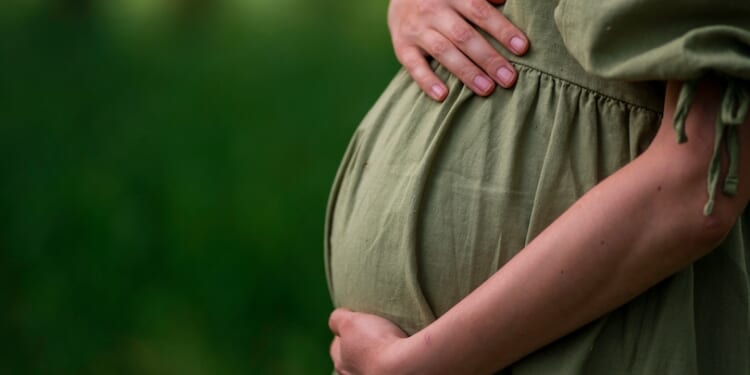(LifeSiteNews) — A study released by the American College of Obstetricians & Gynecologists (ACOG) is advising medical professionals to encourage pregnant women to stop using marijuana due to its negative health impacts on preborn children.
“Cannabis exposure during pregnancy has been associated with low birth weight, small-for-gestational-age neonates, neonatal intensive care unit admission, and perinatal mortality,” the newly-released report says. “Obstetrician–gynecologists and other obstetric health care professionals should be aware of the possibility of pregnant and lactating patients’ use of cannabis and be prepared to counsel and screen all patients and use evidence-based strategies to reduce cannabis use.”
Marijuana, also known as cannabis, has been legalized by an increasing number of states in recent years despite it remaining outlawed by the federal government. Liberal activists and Democratic politicians claim that recreational use is essentially harmless and that “medical marijuana” can help those who suffer from crippling ailments.
However, dozens of studies have found a link between marijuana use and psychosis and schizophrenia, particularly when used in one’s teens or early 20s while the brain is still developing. States that have legalized marijuana have also seen increased deaths from traffic accidents.
The ACOG’s report, which was released last month and uses pro-transgender terminology, notes that there are a number of harmful side effects that children in the womb suffer if their mother consumes marijuana while pregnant.
“Adolescents and adults exposed to cannabinoids prenatally are at increased risk of developing substance use disorder or psychiatric disorders” as well as “diminished cognitive functioning in verbal reasoning, language comprehension, and executive function,” the study reads.
If further pointed out that preborn children “exposed to cannabinoids in utero also demonstrate altered arousal patterns, regulation, and excitability in the first month of life.” The study blamed liberalized marijuana laws for the wider usage of cannabis in recent years, while explaining that “prevalence of cannabis use among pregnant and lactating individuals ranges from 3.9% to 16.0%. Among young adults aged 19–22 years, cannabis usage is reported to be as high as 43%.”
The first trimester is the most common period of pregnancy when women use cannabis due to “pregnancy-related nausea and vomiting.”
In August, President Donald Trump announced he was considering changing marijuana from its current classification as a Schedule I drug to the far milder Schedule III category (which would put it alongside legal drugs that can be misused, such as Tylenol with codeine). Nearly 50 socially conservative organizations joined forces to urge Trump to not go through with his plans. To date Trump has not taken further action.
A study published in Nature Communications this month confirmed the dangers of marijuana, though its focus was on the harm it poses to pregnant women themselves as opposed to the preborn children they carry.
“THC exposure seems to impact critical transcripts involved in key oocyte maturation processes, fertilization, early embryo development and implantation,” the report found.
THC, also known as tetrahydrocannabinol, is the psychoactive component of cannabis, or marijuana. The concentration of THC in marijuana has increased from around three percent in the 1980s to nearly 30 percent in the 2020s, making it even more potent, and dangerous, than in past decades.
The ACOG report noted the severely negative impact THC has on unborn children.
“Cannabinoid receptors are present in the fetus as early as 5 weeks. The main psychoactive component of cannabis, THC, is lipid-soluble, can cross the placenta, and can transfer into breast milk,” it reads. “Although the concentration of THC through the placenta and breast milk is dependent on several variables… the fetal concentration of THC has been reported to be approximately 10% of the maternal concentration, and the risk of adverse outcomes increases in a dose-dependent fashion.”
Despite its positive findings, the ACOG report claimed that the term marijuana “has racist and xenophobic undertones associated with its use throughout the 20th century.” It also encouraged medical professionals to use “gender-inclusive language or gender-neutral language” when speaking with women to encourage them to not use the drug.
President Trump had a mixed record on marijuana in his first term, expressing openness to some reforms yet repeating some Obama-era policies that were supportive of medical marijuana. Last year, he endorsed a failed amendment to decriminalize the drug recreationally in Florida after meeting with Kim Rivers, a major legalization donor and CEO of cannabis company Trulieve.
CatholicVote.org, Family Research Council, the National Narcotic Officers’ Associations’ Coalition, the Drug Enforcement Association of Federal Narcotics Agents, the American Principles Project, and others were among those who voiced opposition to Trump’s proposal to lessen the drug’s categorization.
“You have an opportunity to make a stand for the safety of children across America by opposing the flawed proposal to reschedule marijuana,” they said in a joint letter. Reclassifying marijuana “would result in serious harm to public health and safety, with a particular emphasis on the welfare of children.”

















